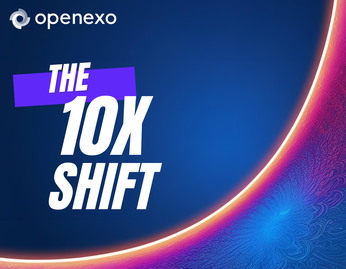
Choosing the Right Framework for Radical Growth or Incremental Change: Digital Transformation vs. Exponential Organizations
Digital transformation optimizes existing processes for efficiency, while OpenExO fosters radical, organization-wide change by leveraging exponential technologies and a Massive Transformative Purpose (MTP) to achieve 10x growth, rewriting industry rules and driving transformative innovation.
Are you preparing your organization for the future, or just catching up to the present? While digital transformation enhances what you already have, OpenExO dares you to think bigger; redefining industries, creating exponential growth, and embracing a bold new vision. Here’s how to decide which strategy fits your goals.
In today’s fast-evolving business landscape, transformation has become a critical imperative for organizations seeking to thrive and remain competitive. From the integration of new technologies to embracing innovative business models, leaders are confronted with multiple approaches to drive change. Two prominent frameworks often discussed in this context are traditional digital transformation and OpenExO.
While both aim to improve business performance, their objectives, methodologies, and impacts vary significantly. Digital transformation primarily focuses on leveraging technology to optimize existing processes and enhance operational efficiency. In contrast, OpenExO pushes organizations beyond the incremental path, promoting radical change by harnessing exponential technologies and embracing a Massive Transformative Purpose (MTP).
This article presents a detailed comparison of traditional digital transformation and OpenExO across four key dimensions: focus and approach, scope of transformation, timeframe and impact, and collaboration. By understanding these distinctions, managers and executives can make informed decisions when charting the future of their organizations.
Focus and Approach
The focus and approach of digital transformation and OpenExO differ fundamentally, shaping how organizations pursue innovation and adapt to change.
Digital Transformation
At its core, digital transformation emphasizes integrating digital technologies into existing business frameworks. Its primary objective is to improve operational efficiency, elevate customer experiences, and enhance productivity. This approach reimagines traditional business models by infusing them with technologies such as cloud computing, artificial intelligence (AI), and the Internet of Things (IoT). However, the emphasis often remains on optimizing current processes rather than creating entirely new models of operation.
For example, a retail company undergoing digital transformation may implement AI-driven customer service chatbots or adopt data analytics to fine-tune its supply chain. While these initiatives improve the organization’s competitiveness, they typically target incremental gains within the framework of the existing business.
OpenExO
OpenExO, on the other hand, ventures beyond incremental improvements. It is a framework designed to build Exponential Organizations (ExOs) as entities capable of achieving 10x growth and outperforming traditional counterparts by leveraging exponential technologies. Rather than merely enhancing existing business models, OpenExO focuses on creating entirely new paradigms.
Central to OpenExO’s methodology is the adoption of a Massive Transformative Purpose (MTP). It is a bold and inspiring mission that drives an organization’s strategy and culture. Furthermore, OpenExO encourages agility and innovation by embracing disruptive technologies and fostering experimentation.
For instance, an organization following the OpenExO approach might design a platform that connects underutilized assets with untapped markets, disrupting traditional supply chains entirely. This transformation is not about tweaking existing systems, it is about rewriting the rules of the industry.
In summary, digital transformation aims to enhance traditional business models through technology, while OpenExO focuses on rewriting the playbook by fostering exponential growth and embracing transformative innovation.
Scope of Transformation
The scope of transformation under digital transformation and OpenExO diverges significantly, with one focusing on incremental advancements and the other targeting radical, organization-wide shifts.
Digital Transformation
Digital transformation typically unfolds within well-defined boundaries, focusing on specific processes, systems, or departments within an organization. It is more about fine-tuning the existing structure by incorporating modern technologies to enhance productivity or efficiency. For example, a manufacturing company might automate a production line using robotics or implement a new customer relationship management (CRM) system to streamline customer interactions.
This approach is often incremental in nature, with organizations focusing on digital upgrades to one area after another instead of transforming the enterprise holistically. While these changes contribute to improved operations, they rarely extend to redefining the organization’s fundamental identity or its role in the market.
OpenExO
OpenExO embraces transformation on a much larger and more holistic scale. It aims to disrupt the status quo across the entire organization, addressing not only processes and systems but also the foundational business model, mindset, and culture. This comprehensive approach fosters adaptability, scalability, and innovation in a way that can redefine an industry.
For instance, a logistics company utilizing OpenExO principles might reimagine its entire business strategy by adopting autonomous vehicles, creating an open data platform, and collaborating with an ecosystem of partners to create a global "logistics-as-a-service" model. This goes far beyond improving delivery times. It transforms how logistics are perceived, accessed, and delivered in a technology-driven world.
The key distinction lies in the ambition of the transformation. Digital transformation concentrates on improving the existing structure, while OpenExO focuses on creating an entirely new landscape, often with an emphasis on tackling larger challenges that extend to market positioning and societal impact.
Timeframe and Impact
The timeframe and impact of digital transformation and OpenExO highlight another significant difference between these two approaches. While digital transformation typically focuses on gradual progress, OpenExO is designed to drive rapid, exponential change with far-reaching implications.
Digital Transformation
Digital transformation projects are often long-term initiatives. Organizations may spend several years integrating digital tools, upgrading infrastructure, and training employees before reaping noticeable benefits. The outcomes of these efforts tend to manifest gradually, resulting in consistent but relatively incremental enhancements.
For example, a financial services company might spend several years transitioning its on-premises IT systems to a cloud-based infrastructure. While this shift improves flexibility, cost efficiency, and scalability, the overall impact on market performance or competitive positioning may be moderate and take time to solidify.
Digital transformation often aims to achieve short- to medium-term goals, such as reducing operational costs or improving the customer experience. These objectives are undoubtedly valuable but may not fundamentally alter the industry or ecosystem in which the organization operates.
OpenExO
In contrast, OpenExO operates on a different timescale and magnitude. By leveraging exponential technologies and adopting innovative business models, OpenExO aims to deliver rapid, transformative outcomes. Organizations that follow this framework prioritize scalability, agility, and long-term societal impact, enabling them to disrupt markets and achieve significant growth within shorter timeframes.
Consider a healthcare startup applying OpenExO principles to harness artificial intelligence for early disease detection. Within just a few years, such a company could achieve a seismic impact in the healthcare industry by saving countless lives, reducing costs, and setting entirely new standards for care delivery. This level of transformation not only benefits the organization but can also reshape the broader industry or even society.
Ultimately, where digital transformation pursues incremental improvements over years, OpenExO often leads to accelerated, exponential growth that redefines industries and achieves substantial, long-term impact.
Collaboration and Ecosystem
Collaboration plays a pivotal role in how digital transformation and OpenExO are executed. While digital transformation tends to be more isolated, OpenExO thrives on a collaborative, ecosystem-driven approach.
Digital Transformation
Digital transformation projects are frequently undertaken within the confines of an organization. While companies may hire external consultants or vendors to manage specific tasks, the transformation often remains a siloed effort, largely limited to internal teams and resources. This approach can lead to fragmented knowledge and missed opportunities for cross-industry innovation.
For instance, a corporation implementing a new enterprise resource planning (ERP) system might rely solely on in-house IT teams and software providers to carry out the project. While this approach ensures tight control over the process, it lacks the diversity of thought and expertise that can emerge from engaging a broader network of collaborators.
This independent, often isolated way of working can sometimes hinder organizations from embracing disruptive ideas or identifying revolutionary growth opportunities that lie beyond their familiar boundaries.
OpenExO
In contrast, OpenExO is built on an ethos of open collaboration and community-driven transformation. At the heart of this framework is the OpenExO platform and community; a global network of experts, innovators, and thought leaders who work together to share knowledge, resources, and best practices.
This collaborative approach enables organizations to tap into a wealth of expertise and diverse perspectives, fostering an environment of innovation and collective problem-solving. Instead of working in isolation, companies participating in OpenExO benefit from the shared experiences of others who have successfully implemented exponential strategies.
For example, a business seeking to become an Exponential Organization might partner with mentors, explore case studies from peer companies, and co-create solutions with other members of the network. This ecosystem-driven model not only accelerates the pace of transformation but also ensures that organizations remain at the forefront of innovation by leveraging global collaboration.
In summary, while digital transformation often focuses on internal, siloed efforts, OpenExO adopts a community-oriented approach that breaks down barriers and enables collective growth. This shift from independence to interdependence is a key driver of the exponential results achieved by OpenExO.
Conclusion
In today’s competitive and fast-changing world, the choice of transformation strategy can determine whether an organization simply survives or thrives. While digital transformation and OpenExO both set out to improve organizational performance, their distinctions make them uniquely suited to different objectives and contexts.
Digital transformation focuses on integrating technology to optimize existing processes and systems. It delivers incremental improvements in efficiency, customer experience, and operational effectiveness, making it a valuable approach for organizations seeking steady, short- to medium-term growth. However, its scope is often confined to specific areas within a business, and its siloed nature can limit broader systemic change.
OpenExO stands apart with its bold, disruptive framework designed to create Exponential Organizations capable of achieving rapid and significant growth. By embracing exponential technologies, fostering a culture of innovation, and adopting a Massive Transformative Purpose (MTP), OpenExO encourages organizations to address global challenges and rethink traditional business models. The collaborative, ecosystem-driven approach ensures access to expertise, ideas, and insights that drive exponential impact across entire industries.
For managers and executives, the choice between digital transformation and OpenExO hinges on organizational goals, market dynamics, and the desired pace of change. While digital transformation is ideal for optimizing current operations, OpenExO offers a path to radical reinvention and long-term impact.
By understanding these frameworks and selecting the right approach, leaders can position their organizations for sustained success in a world dominated by rapid technological advancement and shifting market landscapes.
Join OpenExO for an ExO Discovery Workshop to learn more.
ExO Insight Newsletter
Join the newsletter to receive the latest updates in your inbox.








